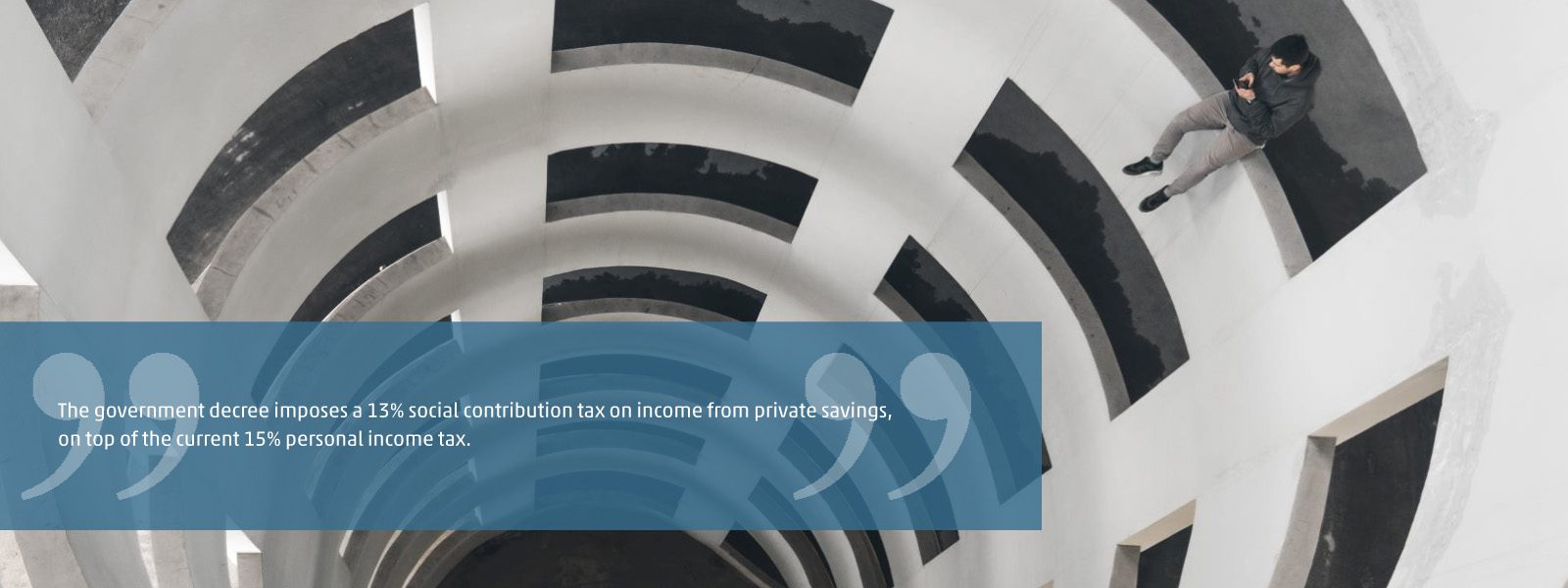Overnight on 31 May, a government decree was published in the Hungarian Gazette imposing a 13% social contribution tax on income from private savings, on top of the current 15% personal income tax. The social contribution tax on savings in Government Decree 205/2023 is currently payable during the period of the state of emergency declared due to the armed conflict in Ukraine, but its future is still up in the air.
According to the government decree entering into force on 1 July, natural persons have to pay social contribution tax on the part of the interest income under Section 65 of the Personal Income Tax Act – with the exception of interest income from real estate fund units – that is taken into account as the basis for personal income tax on interest income.
What was the situation so far?
Previously, there were several types of taxable income on which no social contribution tax was payable. These included interest income, which is now subject to a 13% social contribution tax, or income from controlled capital market transactions and crypto currency income, which will continue to be taxed at just 15%. As a general rule determined several years ago, the tax liability on returns from securities held in a long-term investment account is lowered from 15% to 10% after three years, and to 0% after five years, meaning that after a certain time there was no tax liability at all, and under the new rules, no social contribution tax liability will be imposed on this income either. The same applies to long term pension saving accounts.
Who is affected by the new social contribution tax on savings?
The new social contribution tax on savings will mainly affect Hungarian individuals, and foreigners who are Hungarian tax residents. The government decree does not apply to companies.
What is it paid for?
The social contribution tax on savings is payable on deposits with banks, interest on sums held on current accounts, on bonds if interest is paid on them, and on the return from insurance settlements, so on almost every type of interest income.
What is it not paid for?
There will be no social contribution tax on savings in the case of government bonds, and the returns from real estate funds will not be subject to the 13% tax either.
Interest on member loans is treated differently from the above. The Personal Income Tax Act only includes cooperative member loans under taxable interest income. If a Hungarian company has extended a member loan to its Hungarian owner and pays interest to the individual on it, this counts as earned income in respect of this relationship. By definition, it is not interest, so it does not fall under the scope of the Social Contribution Tax Act on this basis, but the details of the member relationship must be examined and personal income tax and social contribution tax must be accounted for accordingly.
When do you have to pay?
The government decree enters into force from 1 July, so if your money is sitting on a current account, you will have to pay the 13% extra tax on any interest earned on that current account after 1 July. For fixed-term deposits, the additional burden applies to deposits fixed after 30 June, and in the same way for securities, to interest on securities acquired after the decree enters into force, furthermore, to insurance settlements of insurance contracts concluded after the decree enters into force.
Due to the nature of the tax changes brought in by this decree, and the lack of consultation and opinions given the swift decision process, there are still many uncertainties and unanswered questions surrounding the social contribution tax on savings. Our tax specialists, however, will be happy to provide more information to our clients and delve into the more complex tax situations. Feel free to contact us.











